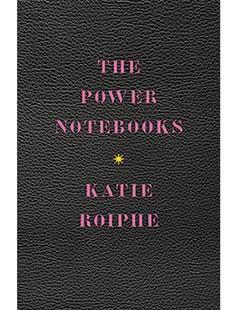Katie Roiphe *95 burst onto the national scene in 1993 with a polemic, The Morning After, challenging the widespread cultural panic about date rape on college campuses. She was hardly done making enemies. In a controversial 2018 Harper’s article, she took the #MeToo movement to task, arguing that it overrode due process, failed to distinguish sex crimes from lesser transgressions, and muzzled dissent.

Roiphe says The Power Notebooks is consistent with her career project of questioning oversimplified political speech. “I’ve always written about the inadequacy of political language to get at the complexities and intricacies of experience,” she says. “That’s been my obsession, my theme.”
Composed in fragments and inspired by the journals she has kept since age 12, the book explores the contrasts between the public and private lives of women writers, including Roiphe herself. Her subjects include Simone de Beauvoir, Mary McCarthy, and Sylvia Plath — all, to varying degrees, in thrall to the literary men they loved. “Her long-maintained abjection is almost an achievement,” Roiphe writes of de Beauvoir’s relationship with the philosopher Jean-Paul Sartre.
The book captures what Roiphe calls “some of the weird ways I’ve behaved over the years.” She describes walking on eggshells during her first marriage, afraid to trigger her husband’s temper. During one car trip, she was unable to quiet their infant, and he demanded that she walk home with the baby in her arms. She complied. But she rejects labeling her ex-husband “emotionally abusive,” preferring to see them as mismatched — and noting that he has since become a friend.
She describes two other less-than-satisfactory relationships — a prolonged tryst with the father of her second child and a dalliance with a man 20 years her senior, “both gifted at and panicked by intimacy ... responsible to no one, beholden to no one, faithless, family-less … . ” A friend nicknamed him “the Claw,” in tribute to both his hold on Roiphe and his seemingly monstrous behavior.
Even more troubling is the sexual relationship Roiphe pursued, at 15, with a rabbi in his 30s. “I felt shame for liking the things we did, for wanting them,” she writes. “I felt deep repulsion at what was happening even as I was enjoying it.”
“I had played down the dark side of that story for a long time,” she says.She still declines to call the experience molestation, saying: “It is possible that this man was abusing his power, but I also had some agency, or got something out of this situation.” But she now realizes: “I also wasn’t as in control as I thought. At the time it was scarier and more upsetting than I have allowed myself to confront.”
The Power Notebooks sets out to show that “you can be both a strong public person, and also sometimes not so strong,” Roiphe says. In fact, she says, it is hard — for her or for anyone — “to be a kind of feminist warrior heroine all the time.” Letting go of that belief can be “liberating,” she says.
While she celebrates the contentment of her second marriage, Roiphe says she sought to avoid too pat a conclusion about women and power. “I believe a lot of these contradictions are huge and innate and inescapable,” she says.












No responses yet